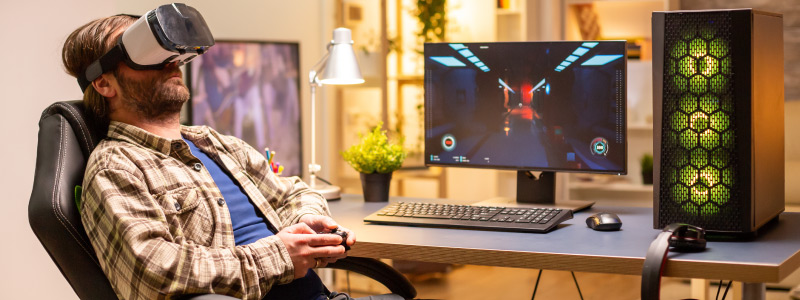Gaming ethernet vs Wi-Fi: Which is better for gaming?

Matthew Harrington

The controversy between Ethernet and Wi-Fi for internet gaming is an ongoing subject of discussion. This article on "Gaming Ethernet vs Wi-Fi: Which is Better for Gaming?" will provide you with an in-depth analysis to help make an informed decision based on your gaming preferences and setup.
We'll discuss how Ethernet performance offers direct wired connections for optimal speed, minimal interference, and lag. On the other hand, we'll delve into Wi-Fi's advancements like WiFi 6 (AX) standard while addressing challenges faced by weak signals or lost data packets.
Furthermore, this comprehensive guide will compare connectivity options across various consoles such as PlayStation 4/5 Xbox One/Series XS PC/Mac/Linux with built-in ethernet ports and Nintendo Switch relying on Wi-Fi connectivity. We'll also explore how device type & location preferences impact your choice between these two connection types.
Lastly, we will examine how different gaming genres and competitive levels can influence your decision when choosing between a wired or wireless connection for an enhanced online gaming experience.
Ethernet performance in gaming
For gamers who prioritise low latency and high-speed connections, Ethernet performance is the way to go with its direct wired connection to the server.
Direct wired connection for optimal speed
With Cat 6 cables supporting up to 10 Gbps speeds, Ethernet cables are ideal for downloading large game files or streaming high-quality content without any hiccups.
Minimal interference and lag
- Lag reduction: A wired connection means less chance of experiencing delays during gameplay, resulting in lower latency times essential for competitive gaming where every millisecond counts.
- Better signal stability: Ethernet cables offer consistent signal quality ensuring stable connectivity throughout your gaming sessions, unlike wireless signals that can be affected by physical barriers or other electronic devices operating on similar frequencies.
Wi-Fi performance in gaming
Despite improvements in Wi-Fi technology, gamers still face challenges with signal strength and slow speeds when downloading game files.
- WiFi 6 (AX) standard: This latest Wi-Fi technology offers faster data transfer rates, increased capacity for multiple devices, and reduced latency compared to previous generations.
- Interference and lost data packets: Wi-Fi connections can still suffer from interference caused by other electronic devices or physical obstructions within your home, leading to lag spikes and disrupted gameplay experiences.
To optimise your Wi-Fi performance for gaming, invest in a high-quality router with features like beamforming technology and Quality of Service (QoS) settings designed for gaming traffic prioritisation.
Consider powerline network adapters as an alternative means of providing wired-like connectivity without running Ethernet cables throughout the house.

Comparing connectivity options on consoles
Deciding on the correct connection for your console may be a critical element in providing an optimal gaming experience.
Most modern systems like PlayStation 4/5, Xbox One/Series XS, and various PC/Mac/Linux platforms come with built-in Ethernet ports for faster and more reliable gameplay.
But, if you're a Nintendo Switch user, you're stuck with Wi-Fi only, which can lead to slower speeds and higher latency during intense multiplayer sessions.
- Built-in Ethernet ports: PlayStation 4/5, Xbox One/Series XS, PC/Mac/Linux provides optimal performance through wired connections like a gaming ethernet cable.
- Wi-Fi only: Nintendo Switch users must rely on wireless networks which may lead to slower speeds and higher latency in certain situations.
When deciding between Ethernet or Wi-Fi, consider your device type, location preferences, and genre & competitive level requirements.
Device type & location preferences impact choice
The choice between using an Ethernet cable and relying on Wi-Fi may depend on your preferred gaming device type and location preferences.
Portable consoles like the Nintendo Switch or laptops might prefer the convenience and flexibility offered by untethered setups, allowing freedom to move about homes without being restricted by physical connections.
- Portable consoles and laptops preferring Wi-Fi: Gamers who enjoy playing games on handheld consoles or laptops prioritise mobility over performance, making wireless connections more suitable for playing from any room in their home.
- Desktop computers prioritising Ethernet connections: Desktop computer users prioritise performance stability over mobility due to its stationary nature, requiring dedicated spaces such as desks or gaming rooms with minimal interference from external factors like signal strength fluctuations caused by distance or obstacles.
Consider how vital low latency is for your specific gaming needs when choosing between Ethernet and Wi-Fi connectivity options.
For gaming optimisation advice, look at our blog on optimizing your internet speed for gaming.
Gaming genre & competitive level impact decision
When deciding between Ethernet and Wi-Fi, consider the type of games you play.
Casual gamers who enjoy single-player titles or less competitive online experiences may not need Ethernet's reliability benefits.
However, for highly competitive multiplayer matches where every millisecond counts, a wired connection is a must.
Casual gaming with less need for low latency
If you're into casual gaming like puzzle games, platformers, or adventure titles such as Animal Crossing: New Horizons and Stardew Valley, then a stable Wi-Fi connection may suffice.
Network latency won't be a major factor in your enjoyment of these casual games, since they don't require quick reactions or intense action.
Highly competitive gaming requiring optimal performance
- Fighting games: Titles like Street Fighter V and Tekken 7 demand precise inputs within tight windows to execute combos effectively.
- First-Person Shooters (FPS): In FPS games such as Call of Duty: Warzone or Overwatch, quick reflexes are key - even milliseconds can make the difference between victory and defeat.
- Mobility Online Battle Arenas (MOBAs): In MOBA titles like League of Legends or Dota 2, coordinating with teammates while executing complex strategies requires minimal input delay.
In these cases, a wired Ethernet connection is highly recommended to ensure the best possible performance and give you that competitive edge.

Conclusion
When it comes to gaming, Ethernet reigns supreme with its stable and reliable connection, minimal interference, and lag.
However, with the advancements in the WiFi 6 (AX) standard, wireless connections have become more viable for gaming.
The choice between Ethernet and WiFi ultimately depends on factors such as device type, location preferences, gaming genre, and competitive level.
If you're playing highly competitive games that require optimal performance or using a desktop computer, Ethernet is likely the better option. Conversely, if you're not playing intensely or are utilising portable consoles/laptops without integrated ethernet connections, WiFi could suffice.
But let's be real, who wants to deal with lag and buffering during a heated gaming session?
So, if you want to avoid the frustration of lag and ensure a smooth gaming experience, go with the best internet deals found at HomeLinkd, check them out you won't regret it!










